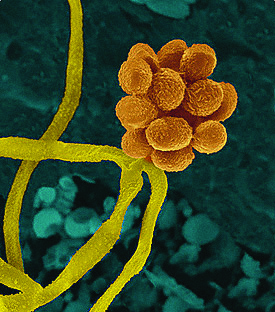July 1, 2016 Print
Improving Australia’s emergency response to infectious diseases through a national research effort is the focus of a new $5 million National Health and Medical Research Council (NHMRC) Centre of Research Excellence (CRE).
 Stachybotrys
Stachybotrys
The Australian Partnership for Preparedness Research on Infectious Diseases Emergencies (APPRISE) will bring together Australia’s leading experts in clinical, laboratory and public health research to address the key components required for a rapid and effective emergency response to infectious diseases.
One of APPRISE’s Chief Investigators, Professor Tania Sorrell, who is Director of the Centre for Infectious Diseases and Microbiology at The Westmead Institute and of the Marie Bashir Institute for Infectious Diseases and Biosecurity at the University of Sydney, echoed Chief Investigator Professor Sharon Lewin from the Peter Doherty Institute for Infection and Immunity in Melbourne, in saying that the new CRE would ensure Australia is equipped for a more coordinated, effective and evidence-based response to infectious disease outbreaks.
“To ensure national and regional health security, emergency responses to infectious diseases must be highly effective, coordinated and based on the best available evidence,” Professor Sorrell said.
“Research coordination, adaptable research protocols and efficient, secure data sharing are needed to develop a strong evidence base for preparedness, response and recovery from such events.
“This national consortium, with engagement of key animal health, community and international collaborators, will focus on the major infectious diseases threats including influenza, coronaviruses, hemorrhagic viral diseases, arboviruses, novel pathogens and antimicrobial resistance.”
The Westmead and Marie Bashir Institutes will collaborate with the Doherty Institute and multiple organisations around Australia to create a truly national network.
Research projects will include infection prevention in primary care, hospital and critical care services; public health surveillance platforms and protocols; rapid diagnostics, biomarkers and biobanking; and the needs of key populations including Indigenous Australians, and the Asia-Pacific region.
NHMRC Chief Executive Officer, Professor Anne Kelso said the new Centre would play an important role in Australia’s readiness to respond to future pandemics and other infectious disease emergencies.
“History tells us that new infectious diseases will continue to emerge but that we cannot predict when, where or how. The purpose of this significant NHMRC grant is to establish national capability to respond rapidly when such threats do emerge by undertaking the research needed to inform the public health response,” Professor Kelso said.
APPRISE participating institutions:
The Peter Doherty Institute for Infection and Immunity, The University of Melbourne and The
Royal Melbourne Hospital
Marie Bashir Institute for Infectious Diseases and Biosecurity, The University of Sydney
University of Western Australia
The Kirby Institute, University of New South Wales
Menzies School of Health Research, Charles Darwin University
Monash University
The Westmead Institute for Medical Research, The University of Sydney
Pathwest Laboratory Medicine
Geelong Centre for Emerging Infectious Diseases, Deakin University
University of Queensland
University of Adelaide
Griffith University
James Cook University
Australian Red Cross Blood Service
Queensland Health
Burnet Institute